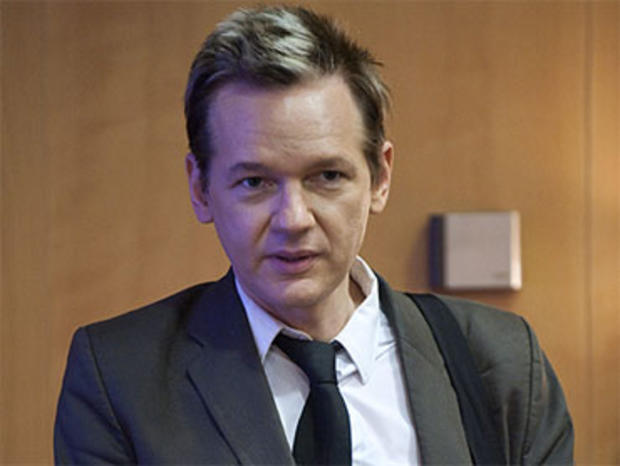Digital Whack-A-Mole: WikiLeaks Back on Swiss Net Domain
WikiLeaks re-emerged today on a Swiss Internet domain, sidestepping a move that had in effect taken the controversial site off the Internet.
The group, under heavy criticism in some quarters for publishing U.S. diplomats' classified cables, has been working hard to keep operating amid distributed-denial-of-service (DDOS) attacks over the Internet and Amazon's decision to stop hosting WikiLeaks' Web site.
A new problem arose at 7 p.m. PT Thursday, when EveryDNS.net stopped providing WikiLeaks with Domain Name System (DNS) services. The DNS translates the Web addresses that people type, such as CNET.com, into the numeric Internet Protocol addresses that actually get the job done delivering data from one computer to another. When EveryDNS.net stopped the service, typing "WikiLeaks.org" into a browser led nowhere.
In a statement on its Web site, EveryDNS.net said it terminated WikiLeaks' service to protect others using the service while WikiLeaks was under the DDOS attack.
The services were terminated for violation of the provision which states that "Member shall not interfere with another Member's use and enjoyment of the Service or another entity's use and enjoyment of similar services." The interference at issues arises from the fact that wikileaks.org has become the target of multiple distributed denial of service (DDOS) attacks. These attacks have, and future attacks would, threaten the stability of the EveryDNS.net infrastructure, which enables access to almost 500,000 other websites.
Thus, last night, at approximately 10PM EST, December 1, 2010 a 24 hour termination notification email was sent to the email address associated with the wikileaks.org account. In addition to this email, notices were sent to Wikileaks via Twitter and the chat function available through the wikileaks.org website. Any downtime of the wikileaks.org website has resulted from its failure to use another hosted DNS service provider.
As it did when tweeting about the Amazon termination, WikiLeaks mentioned the EveryDNS.net's United States connection.
"WikiLeaks,org domain killed by US everydns.net after claimed mass attacks," WikiLeaks said in its tweet.
Anyone with WikiLeaks's numeric Internet address can get to the site without using DNS, and WikiLeaks offered instructions in a follow-up tweet today: "WIKILEAKS: Free speech has a number: http://88.80.13.160"
And later, it re-emerged with a more human-friendly Internet address, also broadcast over Twitter: "WikiLeaks moves to Switzerland http://wikileaks.ch/"
CBSNews.com Special Report: WikiLeaks
WikiLeaks also took issue with Amazon's explanation that it terminated WikiLeaks' service for violating Amazon's terms of service. "It's clear that WikiLeaks doesn't own or otherwise control all the rights to this classified content. Further, it is not credible that the extraordinary volume of 250,000 classified documents that WikiLeaks is publishing could have been carefully redacted in such a way as to ensure that they weren't putting innocent people in jeopardy," Amazon said of its decision.
WikiLeaks doesn't buy it. "Amazon's press release does not accord with the facts on public record. It is one thing to be cowardly. Another to lie about it," WikiLeaks tweeted.
The DNS, centrally administered by a non-profit group called ICANN, the Internet Corporation for Assigned Names and Numbers, is a critical service when it comes to publishing and finding information on the Internet. Rerouting addresses through the DNS is how the U.S. government seized 82 domains associated with copyright infringement.
One response to this situation involves a new effort to create a decentralized DNS, also using peer-to-peer technology. Peter Sunde--one founder of a site called The Pirate Bay that indexes content shared with the peer-to-peer BitTorrent technology--is involved in the project, called P2P-DNS.
"Alternative DNS system based on P2P," Sunde said about the effort in a tweet, though he later took pains to say he was only interested, not the person behind the effort. He added that the "core of the DNS problem is not ICANN. It's that governments and companies can control ICANN (i.e. it's centralised)."
More on WikiLeaks:
WikiLeaks: Mexico Asked U.S. to Counter Chavez
WikiLeaks' Backup Plan
WikiLeaks: CIA Asked State Dept. for U.N. Info
Who is Wikileaks Founder Julian Assange?
WikiLeaks' Assange Being Persecuted, Lawyer Says
WikiLeaks' Assange On Wanted List
WikiLeaks: Putin Likely Knew of Spy Murder Plot
Next WikiLeak Could Turn Assange into Robin Hood
After WikiLeaks, Whistle-Blower Bill Gains Steam
Clinton: WikiLeaks Won't Hurt U.S. Diplomacy
